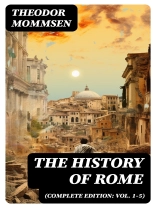The complete edition of Theodor Mommsen’s ‘The History of Rome’ spans five volumes and offers a comprehensive exploration of Roman civilization from its foundational myths to the fall of the Western Empire. Mommsen employs a narrative style combining rigorous scholarship with vivid storytelling, allowing readers to engage deeply with both the political machinations and cultural developments of ancient Rome. The work is notable for its systematic approach and critical analysis, representing a milestone in historical writing and reflecting the influence of 19th-century positivism, which emphasized empirical evidence in historical inquiry. Mommsen, a German historian, philologist, and politician, was awarded the Nobel Prize in Literature in 1902 for his exceptional contributions to the field of history. His passion for the Roman world stemmed from a profound interest in classical studies and a desire to connect the past with contemporary issues in governance and society, which is evident in his meticulous examination of Roman political institutions. This monumental work is essential for anyone seeking to understand the complexities of one of history’s greatest civilizations. Whether you are a scholar, student, or general reader, Mommsen’s ‘The History of Rome’ provides invaluable insights and remains a cornerstone of historical literature.
关于作者
Theodor Mommsen (1817–1903) was a preeminent German classical scholar, historian, jurist, journalist, politician, archaeologist, and writer. Widely revered for his in-depth analysis of Roman history, Mommsen was awarded the Nobel Prize in Literature in 1902 for his celebrated work, ‘The History of Rome (Complete Edition: Vol. 1-5)’, a cornerstone of classical scholarship that offers a comprehensive narrative on the rise and fall of the Roman Republic and the Roman Empire until the reign of the emperor Hadrian. Mommsen’s literary style was both rigorous and engaging, bringing the ancient world to life through meticulous research married with vivid prose. He exercised a profound influence on the study of Roman history, not only through his historical works but also as one of the most authoritative voices in the field of Roman law. His contributions went beyond literature; he took an active role in politics and was a member of the German Reichstag. Mommsen’s scholarship extended to the intersection of epigraphy, historiography, and law, which remains influential to this day, denoting him as one of the giants of nineteenth-century classical studies. His voluminous work continues to be a valuable resource for historians seeking a detailed and scholarly perspective on Roman civilization.












